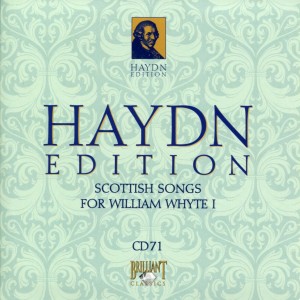 Today’s CD is slightly different. It’s called Scottish Songs For William Whyte.
Today’s CD is slightly different. It’s called Scottish Songs For William Whyte.
Now, to be fair, I don’t know who William Whyte is. (Or why he spells his name like that.)
I also didn’t know the song “Auld Lange Syne” was a Scottish song. Apparently, it is. Because it is the first track on the first collection of Scottish Songs for the aforementioned Mr. Whyte.
If you don’t know what “Auld Lange Syne” means, here’s its entry on Wikipedia. It’s from a poem by Robert Burns. All this time I didn’t know that.
Here’s something else I didn’t know: Robert Burns died quite young (age 37). Given his tremendous influence in the literary world, I thought he lived to be an old man. Thirty seven? Here’s what the Wiki article says:
Burns’s worldly prospects were perhaps better than they had ever been; but he had become soured, and moreover he had alienated many of his best friends by too freely expressing sympathy with the French Revolution and the then unpopular advocates of reform at home. His political views also came to the notice of his employers and in an attempt to prove his loyalty to the Crown, Burns joined the Royal Dumfries Volunteers in March 1795. As his health began to give way, he began to age prematurely and fell into fits of despondency. The habits of intemperance (alleged mainly by temperance activist James Currie) are said to have aggravated his long-standing possible rheumatic heart condition. His death followed a dental extraction in winter 1795.
On the morning of 21 July 1796 Burns died in Dumfries, at the age of 37.
This type of discovery isn’t essential to my life. But it is Continue reading
